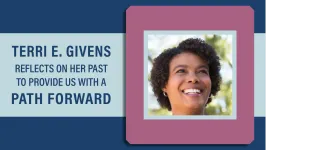"In the front row of the Green College Coach House, a line of Resident Members sits ready and waiting for the talk to begin.
On the far right is Zachary Couture, Resident Member and third-year law student, who helped organize his former professor’s visit and generated excitement within the graduate community. Zachary’s work came to fruition on a Tuesday night in November, when friends, acquaintances and first-time visitors listened to his enthusiastic introduction to the work of Terri E. Givens, Professor of Political Science at McGill University.
“Dr. Givens was my professor when I did my undergraduate degree at McGill,” Zachary says. “I took her upper year class, Trans-Atlantic Immigration and Race Politics.” This was the first time that Zachary, in addition to many other students in the class, was granted the opportunity to discuss the intersection of race and immigration, as well as engage with critical race theory in a political science context. He turns to Terri, sitting in the audience. “You have been such a pleasure to learn from and have been a great inspiration to us, your students.”
With this warm welcome, Terri walks to the front, perching on the table rather than standing behind the podium—an indication that the night’s event would be more of a conversation than a lecture. After thanking Zachary for his kind words, Terri acknowledges that the topic of her latest book, Radical Empathy: Finding a Path to Bridging Racial Divides, is a product of her personal experiences. So that listeners might understand her path to radical empathy, Terri describes her familial and racial background.
Terri’s mother and father were from Louisiana and Pennsylvania, respectively, but they met in Los Angeles. Her father was employed by the Air Force, so the family moved around quite frequently before settling down in Spokane, Washington, where Terri grew up. As a mostly white and Protestant city, Spokane had little in the way of diversity. Her family being Black and Catholic, Terri used to wonder why her parents chose to stay in Spokane. What were their goals?
In reflecting on her past and reading Isabel Wilkerson (author of Caste and The Warmth of Other Suns), Terri came to realize that her many academic achievements are examples of the Great Migration’s generational impact. As participants in the Great Migration, her parents’ and grand-parents’ movement was driven by the urge to secure opportunities for themselves and their children. Their desire to secure a better life drove them to stay in Spokane, eventually allowing Terri to become a first-generation college student at Stanford University. “I am my ancestors’ wildest dreams,” she says.
After Donald Trump was elected in 2016, Terri watched as the divide between people grew larger and more difficult to cross. In an effort to be part of the solution, Terri decided to take a look at her own biases. She thought back to her childhood, when her parents wouldn’t allow her to play with certain other Black kids. She realized that this restriction was a class-based judgment and evidence of internalized oppression. Through reflections such as these, Terri put together the six steps to radical empathy.
- A willingness to be vulnerable.
- Becoming grounded in who you are.
- Opening yourself to the experiences of others.
- Practicing empathy.
- Taking action.
- Creating change and building trust.
According to Terri, to bridge divides with others, we need to start with ourselves. We need to understand our own story, including how our family, community, education, health and relationships impact who we are. By becoming grounded ourselves, we become less prone to defensiveness when hearing the experiences of others. However, in empathizing with people, we are not agreeing with their point of view nor providing absolution. Rather, to empathize means to put yourself in their shoes. This becomes “radical” when we incorporate action, becoming engaged in our local community.
During the Q&A period, an audience member questions whether it is possible to maintain radical empathy in the face of so many atrocities, throughout the world but particularly in the context of Israel and Palestine. Terri observes that people are doing good work every day, which we should use to stay inspired and motivated. “We have the power to create change,” she reminds us.
Terri E. Givens is a Professor of Political Science at McGill University and formerly the CEO of the Center for Higher Education Leadership. She is a sought after consultant and speaker on issues related to leadership and inclusion. She has more than 30 years of experience in higher education, politics, international affairs and nonprofits. Dr. Givens has held leadership positions as Vice Provost at the University of Texas at Austin and Provost of Menlo College (first African American and woman); as well as professorships at University of Texas at Austin, and University of Washington. She was the founding director at the Center for European Studies at the University of Texas and led the university’s efforts in Mexico and Latin America as Vice Provost for International Activities as well as curriculum development. Her most recent published books are Radical Empathy: Finding a Path to Bridging Racial Divides (Policy Press, 2021) and The Roots of Racism: The Politics of White Supremacy in the US and Europe (Bristol University Press, 2022).
Post by: Kyla McCallum, Green College Content Writer and Resident Member.
